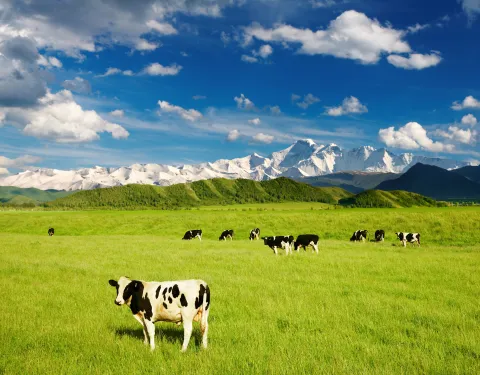Rethink what it means to work in agriculture!
Image
 Agricultural Studies delves into the relationships between the social, economic, political and environmental factors that affect the agricultural sector—from farm level production to environmental law.
Agricultural Studies delves into the relationships between the social, economic, political and environmental factors that affect the agricultural sector—from farm level production to environmental law.

Graduates of the program may pursue careers in areas such as: Animal & Plant Production Management, Trade Development, Entomology, Horticulture, Sales & Marketing, Policy Development and many more.
Located in Southern Alberta, the University of Lethbridge is an ideal location to select a major in Agricultural Studies. Farming and ranching activities are among the most important regional sources of wealth and of direct and indirect employment. The diversity of landscapes provides the foundation for a wide variety of productive activities related to livestock (primarily cattle, hogs and poultry), grains, oilseeds, pulses and numerous specialty crops. In this setting, aspiring agriculturalists learn about the physical and economic interrelationships between agricultural production, marketing, policy development, trade, nutrient management, water, grazing, rangeland and riparian management. Students can enjoy the opportunity to acquire, enhance and apply their skills not only at the University of Lethbridge but also at the Lethbridge Research Centre, the Animal Disease Research Institute, and at the many agri-businesses located throughout Southern Alberta.
The agricultural program at uLethbridge is multidisciplinary in nature, including courses in Agricultural Studies, Biological Sciences, Economics and Geography, among others. Students study in lab-extensive settings that combine practical experience with an emphasis on current issues and relevant research.
Students can achieve a Bachelor of Arts or Bachelor of Science, Agricultural Studies in two ways:
- By completing the requirements for the direct-entry, 40-course BA or BSc, with a multidisciplinary major in Agricultural Studies offered by the Departments of Biological Sciences, Economics, and Geography.
- By first completing an approved diploma program and then transferring directly into the BA or BSc, Agricultural Studies Post-Diploma program at the University of Lethbridge (please see Program Planning Guide for a list of approved diploma programs and institutions).
Your BA or BSc in Agricultural Studies provides an excellent foundation for Environmental Law, Management or Education. Click here to learn more about the courses and career opportunities available.
What is Agricultural Biotechnology?
Agricultural Biotechnology examines agriculture and the natural world, emphasizing the relationships between food production, the environment, science and society.
The program focuses on the life sciences, with prominence given to the application of Biotechnology in agriculture. It also delves into agriculture’s associated sectors including: government, policy development, farm production, environmental implications and agricultural sciences.
Studying Agricultural Biotechnology will give you a strong science and Economics background rooted in both theoretical knowledge and practical experience, and focusing on the issues, research and course materials relevant to agriculture.
Learn more about the Bachelor of Science in Agricultural Biotechnology.
Alberta Institute of Agrologists (AIA)
Once you have completed your degree, you may apply to the Alberta Institute of Agrologists (AIA) to be registered as a Professional Agrologist within Alberta. Contact your program Coordinator early in your degree for further information. The academic requirements for AIA certification can be found on the AIA website.
Co-operative Education Opportunities
Co-operative education offers an opportunity to enhance your academic knowledge with work-integrated learning in the agriculture industry. Explore career options, participate in research and develop skills that complement your degree.
Your education isn’t just about what you learn in the classroom — it’s also about bridging the experiences you have outside of it. As a student at uLethbridge you have an extraordinary opportunity to create an academic experience that fits you like a tailored suit. Combined with a foundation in liberal education and armed with hands-on work experience through co-op, you will graduate with a head start on the path to your future. To learn more, please visit the Career Bridge website.
Scholarships
There are several scholarships offered to new and continuing students who choose to focus their studies in agriculture, click here for more information.
